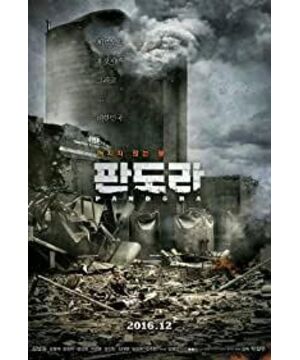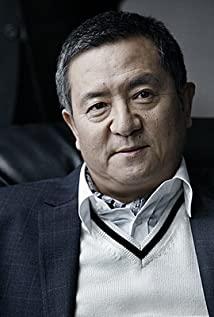As the newest member of the Korean disaster film family, Park Zhengyou's "Pandora" can be regarded as a qualified completion of the task. In addition to feeling again the freedom of Korean films in creation and the ability to polish genre films, some problems have gradually emerged.
With the gradual maturity of the Korean genre film market, the shaping of the protagonist's image in disaster films, the timely firing of tear gas, and the satire and criticism of the government have become almost equally important, which is somewhat putting the cart before the horse. Normally, the tears in the film should be gradually brought out with the development of the story, but in the Korean film, the tear gas was consciously planted at the beginning, so as to wait for the time to detonate. At the same time, South Korean disaster films seem to rely more and more on "the government's inaction or incompetence" to render the protagonist's tragic color and to resonate with the people to realize the film's ambitions. But are these really the necessary elements in this type of film?
Regarding the black
government, this is a link that is almost always involved in today's Korean films, and it is also a prescribed action in Korean disaster films. Mainland audiences' views on the "black government", from the initial admiration and admiration for the Korean film industry , until now, it has gradually revealed that it is completely "black for black's sake" judgment, indicating that any kind of routine has a time when people are tired (Korean idol drama smiles...).
I have always felt that the "black government" can be regarded as a creative technique for Korean films. There needs to be villains in genre films. Such villains can have any identity, such as bad doctors, policemen, workers, businessmen, so of course, they can also include government or institution personnel, who act contrary to personal or group interests. As for public expectations or moral matters, it is essentially to promote the development of the film's story, and everyone should get used to it. For example, the incompetent nuclear power plant management is repeatedly highlighted in this film, in order to form a contrast with the technical director and deepen the image of this old director who worked hard for the nuclear power plant.
In this film, in order to show this national disaster, the president and the prime minister are naturally caught up. However, from the black to the black, "Pandora" did not declare a full-scale war on the government as violently as "Terrorist Live". The young president in this film at least completed the image reversal at the end, and was suppressed by the strong prime minister for nearly an hour. Afterwards, the counterattack finally ushered in, and finally turned from inaction and indecision to turning the tide. The awakening of the president is more in line with the needs of human nature (audience), while the behavior of the prime minister in the film is a "processed" political method. From a political point of view Look, there is nothing materially wrong in what the Prime Minister is doing. The setting of the image of the president and the prime minister in the film is very similar to that of "Influenza".
The film does not punish the responsible person at the end, because "Pandora" is actually a prophetic warning. It imagines the possible impact of an accident in a nuclear power plant. Problems and contradictions have become more serious, as well as the assumption of "distrust" of the government, to achieve a stronger warning effect. This is the significance of this film. It is precisely because Korea has such a relaxed creative environment that some social responsibility functions of the film can be highlighted.
Korean Disaster Movie: The "Reluctant" Hero
This is the prescribed action of a Korean disaster movie - the sensational stage. Family, love, and friendship are all flashpoints. In the end, the death squad entered the accident scene in a bus, in contrast to the fact that they sat lazily on the bus and entered the workplace at the beginning of the film. These little people escaped with their lives in the initial accident. The instinct to survive, but there is no flash in the body. In the end, they awakened collectively, made sacrifices for their family members, and announced the arrival of tears. Afterwards, the director hurriedly stepped up, and while the audience's emotions were just in place, he let the male protagonist attack quickly, and came to a final monologue, and the emotional explosion of the film reached a climax. This kind of Korean-style tear gas is not only their characteristic, but also their weakness, because more and more audiences are tired of this routine. This is also one of the points that "Train to Busan" was criticized before.
Generally speaking, most American disaster films "go the kidneys" and torture the audience's adrenaline. And Korean disaster films focus on the torture of the audience's tear ducts. Although personal heroism will be involved, the male protagonists in Korean disaster films are often more "reluctant" or involuntary. This has changed here in Hollywood. They prefer the protagonist to take the initiative, which is different from the Americans. The hero complex in the bones has nothing to do with it, so the screenwriters will give the protagonists various buffs, such as being a special soldier before, or an expert in a certain field. Maybe even if they have no background, they are durable enough and have their own talents. And most of them are particularly unsocial because of their personality (in fact, others don't understand him), or have divorced experience, and the key children are not owned by him. Finally, through their feats in disasters, they have completed self-redemption and heroic image shaping. .
So in this film, our protagonist was a "reluctant" type. The fault of the country has to be borne by ordinary people, even at the expense of their lives. Instead, the desire for family affection replaces the responsibility for the country, allowing the male protagonist to complete the leap as a national hero. The heroism seen from the bottom-level characters is finally wrapped up in family emotions, which makes the audience even more conscious of the film's cautionary theme in the deep grief. In the monologue of the male protagonist crying bitterly, he candidly reveals his nostalgia for life, his fear of death, his deep love for his family, and his accusations against the country. Weakly press the switch...
But in the same type of Hollywood films, we pay more attention to the uplifting of the protagonist's personal image, and strive to create a heroic spirit. Let the protagonist complete the rescue at the critical moment, so as to realize the psychological sense of completeness of the audience.
Brilliant first 20 minutes
While there's not much new to this Korean disaster film with its familiar formula and taste, the film's textbook first 20 minutes are still good enough. Because the audience has potential expectations for the type of "disaster film" of this film before watching the movie, so during these 20 minutes, a "sword" has been hanging over everyone's head, waiting for the opening of this title. It's called Pandora's "gift".
The appearance of the characters in the play is concise but efficient: as the mother opens the door, the lazy and decadent male protagonist (the most common butt-picking action in Korean films) officially establishes a connection with the outside world, and goes up to the national environment: the president visits intensively , Ordinary people's desire for economic development, down to the male protagonist's family, sister-in-law, mother, nephew, girlfriend and partners, all of them are vivid. And most importantly, we can feel the upheaval that the last nuclear accident brought to this family, which is also a foreshadowing of the subsequent disaster.
At the same time, another story line: the game between the strong prime minister and the young president, the confrontation between the director and the management of the nuclear power plant, etc. are also explained. In the first 20 minutes, the protagonist's desire to escape from his hometown and the safety hazards of the nuclear power plant are two major contradictions at the same time. Finally, with the opening of the "gift" (the explosion of the nuclear power plant caused by the earthquake), the fate of the little person is entangled with the decision of the government department. In this way, the grand national project has established a connection with the low-level petty people, and the disaster film mode has officially started.
View more about Pandora reviews










